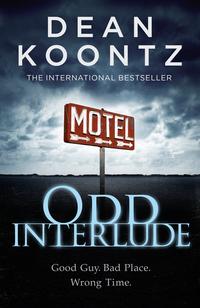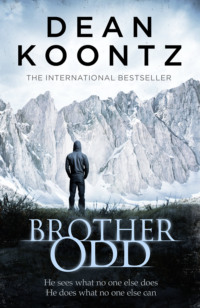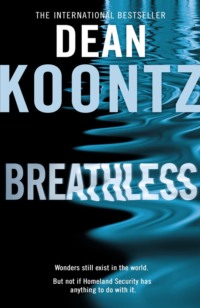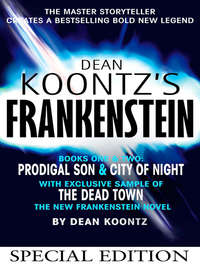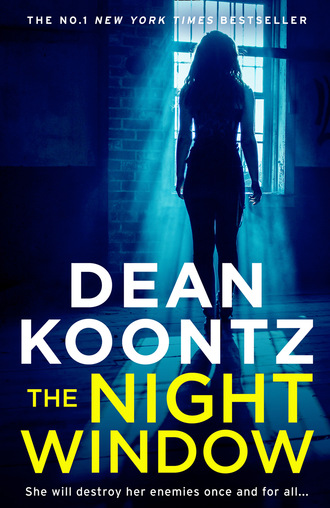
Полная версия
The Night Window
“If I were Hawk,” Jane said, “maybe it wouldn’t be smart of you to say so to my face. Half the world hunting her down, she must be one crazy desperate bitch.”
Garret Nolan smiled again. “I won’t say what service I was in. We did black-ops work in Mexico and Central America, no uniforms, we went native. Our actions targeted MS-13, other gangs, those linked to nests of Iranian operatives in Venezuela, Argentina, Nicaragua.”
He turned his back on her and went to a square of perfboard beside a workbench and took a set of keys from one of the pegs.
“We knew who we were looking for—names, faces—but a lot of the time they changed their appearance. This funny thing happens when you use facial-recognition programs to see through disguises. When you do it long enough, often enough, it’s as if your brain uploads a little of the software, so you develop an eye for a masquerade, no matter how well it’s done.”
When he returned to her, he held out the keys, which she didn’t at once accept.
“Another problem you have is you’re a damn good-looking woman.”
“If I were Hawk, what should I do—scar myself?”
“Women as good-looking as you rarely use so much makeup and eye shadow, such bright lipstick. If it can’t improve the face, maybe it’s meant to obscure it.”
“That’s all you’ve got?”
“The mole on the upper lip. Why haven’t you had it removed?”
“I’m skittish about doctors and scalpels.”
“Fake moles, fake port-wine birthmarks, fake tattoos—they’re popular camouflage. I don’t need a scalpel. Bet I could remove it with a little spirit-gum solvent.”
“Leslie Anderson,” she insisted. “Born in Portland, late of Vegas, got myself in trouble when I jacked five thousand credit-card numbers that my hacker boss had stolen, went into business for myself, running a buy-and-fence operation, until he found me.”
Nolan still held out the keys. “The color-changing contact lens on your left eye isn’t fitted properly. There’s a thin crescent of blue above the gray. Jane Hawk has blue eyes.”
She remembered how, on first meeting him, he had not looked her up and down, but had stared intently into her eyes.
“The ash-blond wig is the best, tightly fitted for action,” he said. “But if the color was natural, your skin would probably be paler. With your complexion, your hair’s more likely to be honey blond—like Jane Hawk’s.”
She took the keys from him. “I don’t have to be Jane Hawk to need the bike. But if you’re hot on giving it to Leslie Anderson—”
“‘—born in Portland, late of Vegas,’” he said. “Another thing is how you move. Spine straight, shoulders back, athletic, quick and confident. That’s how she moves in what film they have of her.”
“Mama Anderson taught her girl not to slouch.”
“Then there’s the fact the media says Jane Hawk took part in some terrorist attack in Borrego Springs three days ago, maybe a hundred dead, maybe a lot more than that. They say she’s still somewhere in Southern California.”
“If I were her,” Jane said, “I’d be long gone from the state.”
Denied the chance to investigate the tote’s contents, the mastiff grumbled with disappointment when Jane picked up the bag.
“I really can pay for this,” she said.
“Then what would I have to brag on when you’re vindicated?”
She stowed the tote in one of the bike’s saddlebags. “Let’s say I’m her. Why would you do this?”
“From my days in … the service, I know how deeply the enemies of freedom have penetrated this country’s institutions, public and private sector. The way they’re demonizing you, their viciousness and ferocity, tells me you’re right about the plague of suicides, and somehow it’s … engineered.”
“I haven’t heard Hawk says it’s engineered.”
“Maybe because nobody’s given her a chance. Digital technology and biotech—somehow they have to be part of this.”
“I wouldn’t know.”
He said, “People are dazzled by high tech, but there’s a dark side, dark and darker. What horror isn’t possible today … it’ll be possible tomorrow.”
“Or maybe it is, after all, possible today,” she said.
12
The three rayshaws were of a physical type, big men with thick necks and broad shoulders and sledgehammer fists, their eyes cold, their stares as impersonal as camera lenses, as if they were not of women born, but instead were immortal archetypes of violence, risen from some infernal realm millennia earlier, having come down the centuries on a mission of barbarity, cruelty, and murder.
They escorted Tom Buckle to the guest suite where he’d left his baggage. Nothing he said could engender a response. They spoke to him only to tell him what he must do. They didn’t overtly threaten him; mortal threat was implicit in their every look and action.
Items that didn’t belong to him had been placed on the bed: long underwear, a flannel shirt, a Gore-Tex/Thermolite storm suit by Hard Corps, two different kinds of socks, supple-looking gloves. Beside the bed stood a pair of boots.
“Strip naked,” one of the men commanded. “Dress in those things.”
Tom recognized the futility of appealing to these creatures’ common humanity, for there was nothing human about them other than their form. Their faces varied, but their expressions were eerily the same, as neutral as the masks of mannequins. No emotion shaped their features. Their faces lacked evidence of personality, and they seemed as remote and ghastly as the pale whiteness of the moon in daylight.
Wainwright Hollister’s movie was in fact reality, and Tom Buckle was the doomed lead in a noir thriller where the theme was meant to be the hopelessness of hoping. He was Edmond O’Brien in D.O.A. Robert Mitchum in Out of the Past.
Watching him undress, the three men said nothing.
He obeyed them. He could do nothing but obey. He believed Hollister’s assertion that they were killing machines.
For twenty-six years, he had lived a relatively charmed life, on a glide path into film directing. He’d never known terror until now. He was terrified not only of these creatures and of Hollister, but also by a sudden sense that a sinkhole might open in his psyche, a sucking black madness from which there could be no escape.
As Tom dressed in the storm suit, Mai-Mai’s suicide played in his memory so vividly that the room around him seemed to darkle like a theater where all the light was contained within the screen: her exquisite face, her beautiful body, she a symbol of mystical power, as if she were a goddess who stepped down from a heretofore unknown pantheon, the scene remembered in black-white-gray, as though from a movie made in the 1930s, but for the scarlet silk scarf that slid off her hand and the muzzle flash of the pistol, her collapsing with an awful grace, her seeming power revealed as an illusion, removed from this world with as little concern as Hollister might give to a cockroach before stamping on it.
The room was warm, but Tom felt as cold as the snow-swept world beyond the windows. His heart drummed with fear, but there was anger in it, too, an icy rage that scared him. He had never been an angry man. He worried that his fury might compel him to do something that would diminish his already slim chance of survival.
When he was suited and booted, with the hood snug around his face, the three men led him into the vast garage, where Hollister maintained a collection of expensive, exotic vehicles: a Lamborghini Huracán, a Rolls-Royce Phantom, a Bugatti Chiron, an armored Gurkha by Terradyne, and maybe twenty others. A showroom-tile floor. A pin spot highlighting each set of wheels.
They took him to a Hennessey VelociRaptor 6 × 6, which was a bespoke version of a Ford F-150 Raptor, a jacked-up six-wheel crew-cab truck with numerous upgrades. The driver sat alone in the front. The other two rayshaws flanked their prisoner in the backseat, so that Tom felt wedged between the jaws of a vise.
As they drove into the gray light and spiraling snow showers of the late afternoon, the hulk to Tom’s right recited the simple rules of the hunt. The quarry would be given a two-hour lead. On foot, he could head in any direction that he wished—except that he must not attempt to return to the residence. Security sensors would be aware of his approach well before he drew near the house, and he would be cut down by Crystal Creek Ranch personnel with Uzis.
“Adjusted people,” Tom said, still struggling to believe what ample evidence proved to be true.
His instructor’s facial features remained as graven as cemetery granite, his stare chisel sharp but shallow. “The quarry will be armed with a nine-millimeter Glock featuring a ten-round magazine.” Neither he nor the other men used Tom’s name or even once referred to him with the pronoun you.
The rayshaw produced the gun, sans ammunition, and briefly explained its features.
Tom owned a pistol with which he practiced, at most, once a year. The other three hundred and sixty-four days, the weapon was in the back of his nightstand drawer. He had no illusions about being a good marksman.
His instructor gave him the Glock. “The magazine and ammunition will be provided upon arrival at the starting position of the hunt. The quarry will also receive six PowerBars for energy, as well as a tactical flashlight.”
“A map,” Tom said. “A map and a compass.”
None of the three men responded.
Snow raveled now in countless skeins through the loom of the day and formed a pristine fabric on the land.
“Hollister said I’d have a fair chance.” There was no evidence that they had heard him. Nevertheless, he said. “What’s fair about this? Nothing. Nothing’s fair about it.”
His own voice embarrassed him, sounded like the whining of a coddled child. He fell silent.
The VelociRaptor grumbled into the growing storm and the slowly dimming day, flakes like midget moths swarming through the beams of the headlights. They had turned off the blacktop that linked the residence to the distant airplane hangar housing the Gulfstream V, and seemed to be following a dirt track difficult to discern under thin shifting scarves of snow.
Fifteen or twenty minutes from the house, the truck came to a stop. The men flanking Tom opened the back doors and got out.
When he hesitated to follow, one of them said, “Now,” putting such menace into one word that Tom at once obeyed.
13
In Garret Nolan’s garage, Jane straddled the motorcycle, flexed her hands around the grips, looking it over—speedometer/tachometer, clutch lever, brake lever, throttle—getting the feel of the machine before putting up the kickstand.
Nolan said, “One more thing you should know. They say Jane Hawk avoids bus stations, train stations, and airports because facial-recognition programs scan travelers for known terrorists and wanted criminals. But that’s not good enough anymore.”
Jane was curious, but Leslie Anderson was on the run only from her former boss, not from the feds, so neither of them expressed interest in what Nolan had said.
“About a year ago,” he continued, “the Chinese government began deploying among their police departments these freaky damn eyeglass-mounted cameras equipped with face-rec tech. Now some of my buddies still in U.S. spec ops recently received the same gear.”
Six months earlier, Jane would have taken such a claim with the entire contents of a salt shaker. Fixed-camera recognition systems were connected to remote facial databases stored in the cloud, so vast they—along with artificial-intelligence analytics—couldn’t be loaded onto the front end of a wearable camera. But technology was advancing at a remarkable pace, especially the tech that could be used for population control and oppression.
“These sunglasses are wired to a handheld device with an offline facial database of up to ten thousand faces,” Nolan said. “The AI is good enough to match a suspect’s face to one in the d-base in just six hundred milliseconds. Fixed cameras have limited lines of sight, but someone wearing these can look everywhere.”
She couldn’t restrain herself from saying, “That sucks.”
Nolan said, “If this gear is being issued to some in the military, you can bet your ass security agencies on the domestic side also have them. So maybe if you ever happen to run into Jane Hawk someday, tell her the one face currently sure to be in that portable d-base is hers. Nowhere is safe.”
“Has anywhere ever been?”
From the seat of a nearby Harley, he picked up a pearl-white Shoei X-9 Air helmet with a dark-smoke shield. “Too bad you can’t wear this everywhere.”
Accepting the helmet, Jane said, “What if they nail me and trace this bike back to you?”
“They can’t.”
“Why not?”
“Ever since I left the military, I’ve been doing business in ways that move me step by step toward the edge of the grid.”
“Gonna go all the way off?”
“Sooner than later, we’ll sell the house and head so far up-country you’d think it was the nineteenth century.”
“Sorry to hear that,” she said. “The more people like you and your wife who get out of the game, the more likely the bastards will win in the end.”
He shrugged. “We’ve got one life, and we don’t want to live any part of it on our knees, which is likely if we stay here.”
14
The two rayshaws walked Tom to the front of the VelociRaptor and about another forty feet through the vehicle’s lances of light before halting. One of them gave him the unloaded pistol. The other put a plastic sack with a drawstring closure on the ground at his feet.
They returned to the truck and boarded it. The vehicle hung a U-turn and drove away, taillights tinting the snow with a suggestion of blood as it dwindled into the white cascades.
Although Tom stood shaking, he was warm enough in his storm suit.
He stooped to open the bag with the drawstrings. It contained the promised PowerBars and a knitted ski mask that he could wear under the storm-suit hood, with holes only for his eyes and mouth. There were also the promised tactical flashlight, the magazine for the Glock, and ten bullets.
He inserted the ammunition into the magazine, the magazine into the pistol, the pistol into a zippered pocket on the thigh of the storm suit’s right leg. He distributed the knitwear and six PowerBars in other pockets.
Maybe the drawstring bag would come in handy. He’d keep it and, until nightfall, carry the flashlight in it.
As he closed the bag, the Bell and Howell Tac Light clinked against something he hadn’t noticed. He fished inside and came up with a microcassette recorder.
When Tom pressed PLAY, Wainwright Hollister spoke to him. “You will die in this lonely place, Tom Buckle. If you’d been injected, adjusted, and sent back to California, at least you’d have had the pleasure of a fleeting orgasm when you raped ten-year-old Kaylee at my command. But although there will be no pleasure for you in the hours ahead, you’ll be blamed for Kaylee’s kidnapping a few days from now, because when her body is found in your home, it will bear your semen and your blood, which we will harvest from you after your death. The world will know you as a monster, Tom, and everyone will despise your films. You will be sought by police but, of course, never found. Who can say how many rapes and murders of other little girls will be attributed to Tom Buckle, the phantom pedophile, in years to come? Please don’t use the nine-millimeter Glock to kill yourself. I’m so looking forward to the hunt and the moment when I remove the threat to a stable future posed by your dangerous ideas and undeniable talent. Get moving, Tom. You have only a two-hour lead.”
Whether the recording was intended to be a psychological weapon that would unnerve Tom and make him easier prey or signified nothing more than the billionaire’s narcissism and cruelty, Hollister had provided his quarry with precious evidence of the murder that he intended to commit and of the Arcadian conspiracy in which he was a key player. Instead of depressing or unnerving Tom, the recording brought the light of hope into his heart and warmed him with the realization that Hollister wasn’t as prudent or smart as he had seemed in the context of his magnificent house and the company of his zombie guards.
He rewound the message and pressed PLAY again, intending to listen only to the threat of the first sentence, so that it might inspire him to escape or put up a hell of a fight if confrontation proved unavoidable. The recorder hissed slightly louder than the descending flakes that softly sheered the air, hissed and hissed, but the words it had conveyed had been erased, evidently even as they had first issued from the speaker.
The meadows were clotted with old snow and silvered with fresh, but he felt as if he stood on a burnt plain, in a world scourged by an apocalyptic fire, the pine woods in the distance as black as columns of char, the current storm an ashfall, the incinerated sky in slow collapse, the unseen sun not merely in decline but dying in the wake of a nova flare.
He could almost believe he was asleep, all this a dreamscape of a world in the wake of judgment. The insanity of the Arcadian scheme and the suddenness with which he’d been plunged into mortal peril merely because his talent put him on a list of undesirables seemed too fantastic to be other than a nightmare that would dissolve when he thrust up from his pillow and threw back the covers and switched on a bedside lamp.
Although he’d never known such cold as this, the day abruptly grew colder when the early stillness of the storm was swept away by a sudden wind out of the northwest. The snowflakes that had kissed his face now nipped. Wind stung his eyes, and tears blurred his vision.
15
Because she was riding a bike much different from the one on which she had sped away with Garret Nolan, Jane risked cruising to the motel, a one-star enterprise trying to pass for a two, where she had left her luggage the previous night.
Her locked suitcases contained nothing irreplaceable. However, because of the urgency of the investigation she’d undertaken and the ever-growing intensity of the search for her, she didn’t have time to go clothes shopping or visit the source in Reseda from whom she obtained guns, driver’s licenses in multiple identities, license plates, color-changing contact lenses, wigs, and other items that were essential to the chameleon changes that kept her free and alive.
They had apparently tied the Ford Explorer Sport to her; but that didn’t mean they knew where her lodgings were. In fact, if they knew, they wouldn’t have come after her in the library, but would have been lying in wait in the motel room when she returned.
If she could safely retrieve her bags, so much the better.
The entire San Fernando Valley had once been a thriving part of the California dream; but some communities were now in decline. The almost third-world shabbiness of this neighborhood belied the Golden State’s image of high style and glamour that was barely sustained by the grace and beauty of the better coastal towns. Potholed streets, littered and unkempt parks, used hypodermic needles glittering in the gutters, graffiti, public urination, and homeless people camped in the doorways of vacant buildings were testament to corrupt and incompetent governance.
The Counting Sheep Motel was a mom-and-pop operation, cracked white stucco with blue trim, sixteen units on two levels encircling a courtyard with a swimming pool. The pool was small, its coping fissured and stained; a mermaid and her adoring entourage of cartoon fish were painted on the bottom, shimmering under water that seemed not quite as clear as it ought to be.
Jane’s room—number three—was on the ground floor, at the front of the building. There was no sign of unusual activity.
She rode to the end of the block, turned right, curbed the Big Dog, and fed coins to the parking meter.
After taking the tote from one of the saddlebags, she walked back to a bar and grill called Lucky O’Hara’s, across the street from the motel. She took her helmet off only as she reached the entrance. In addition to the name of the establishment, the sign above the door featured a pot of gold and a leprechaun.
Assuming Lucky O’Hara had earlier enjoyed a lunchtime rush, now at three thirty-five the crowd had gone. Two retirees sat at the horseshoe bar, each alone, one of them in low conversation with the bartender. A young couple engaged in an intense discussion in one of the booths that lined both side walls. The tables at the front of the room were not occupied. Jane sat at a window table for two, with a clear view of the motel that stood across the street and somewhat west of her position.
If the owner and staff and primary clientele of Lucky O’Hara’s had once been Irish Americans, that seemed no longer the case. The waitress who took Jane’s order—two hamburger steaks, one atop the other, hold the hash brown potatoes, add extra vegetables, a side of pepper slaw, a bottle of Corona—was a pretty blond-haired black-eyed girl with a Bosnian accent.
The pilsner glass was frosted, the Corona ice cold. Properly chilled beer was one of the humble pleasures that kept her in a positive frame of mind during this ordeal of threat and violence. A hot shower, a piece of favorite music, the fragrance of a flowering jasmine vine growing on a trellis, and countless other little graces reminded her of how sweet life had once been and could be again. As motivation, a desire to live well and freely again was second only to her fierce determination to keep her child safe and to give him a future from which those who would enslave him had been eradicated.
She watched the motel during lunch. Red curb restricted parking to the farther side of the street. There were no paneled vans that suggested surveillance. No obvious sentry slouched in any of the cars or SUVs.
A few doors south of the motel, overdressed for the mild day in layers of ragged sweaters and a black-and-green tartan scarf, masses of hair and beard bristling as if fossilized in that configuration following an electric shock, a vagrant sat on the sidewalk, his back against the wall of a vacant storefront. Beside him stood a shopping cart in which were heaped large green trash bags bulging with whatever eccentric collection constituted his treasure.
Such a disguise was within the repertoire of a true stakeout artist. The vagrant was the sole subject of Jane’s suspicion—until he got to his feet, stepped to the recessed entry of the building, dropped his trousers, and defecated. Although a federal agent on such an assignment would take pride in the exactitude of the details of his costume and behavior, he would not feel obliged to take a dump in public for the sake of authenticity.
Glittering in the sunlight, traffic passed in riotous variety. Jane could not detect any vehicles repeatedly circling the block in a rolling surveillance of the motel.
The appearance of normalcy at Counting Sheep concerned her. When nothing whatsoever in a scene looked suspicious, when it seemed picture-postcard serene and downright churchy, it was at such high contrast with everyplace else in this fallen world that you had to wonder if it was a setup. She had developed measured paranoia as a survival trait not just since going on the run, but from her years in law enforcement.
She spooned ice from her water tumbler into the pilsner glass to chill the remaining beer, finished lunch, eyed her watch—4:33—ordered another Corona in a chilled glass, and asked for the check.
She paid and tipped 30 percent as soon as the beer arrived, so that when she took another hour, the waitress wouldn’t worry that maybe she would skip out on the check. She said, “The bastard was supposed to be here when I arrived. I’ll give him another hour to hang himself.”
Whether she had acquired her cynicism in Bosnia or California, the waitress bluntly said, “Dump him.”



